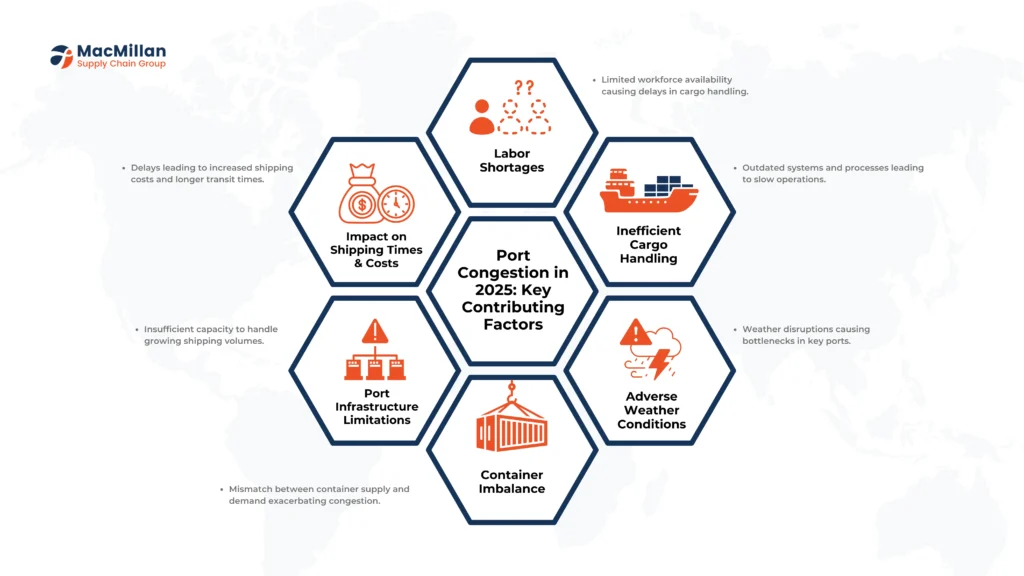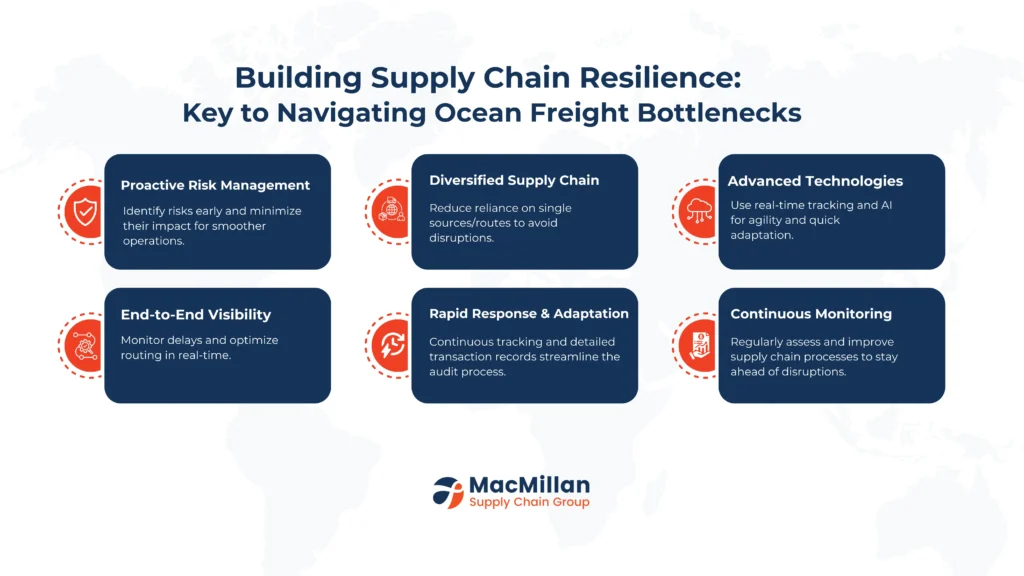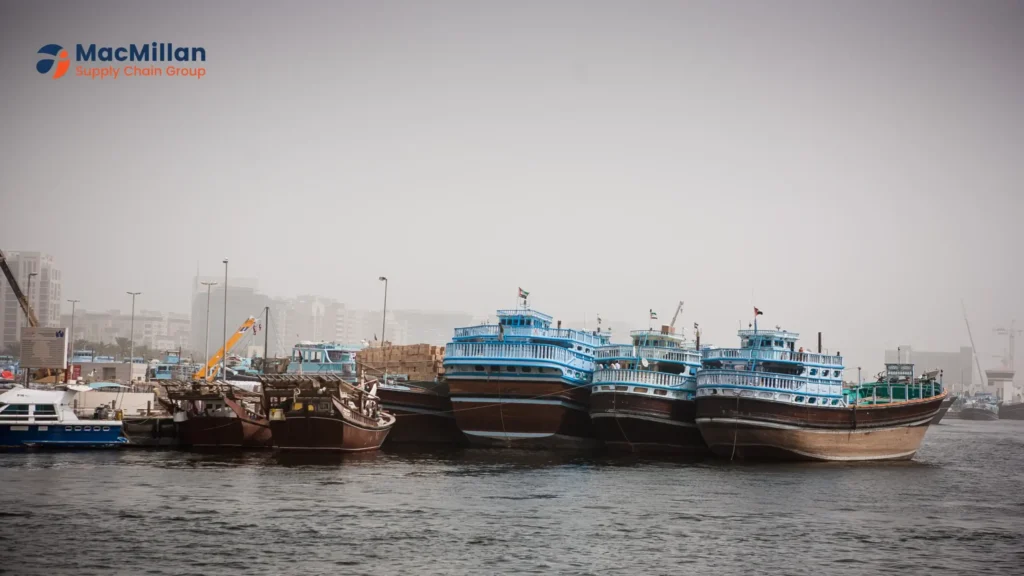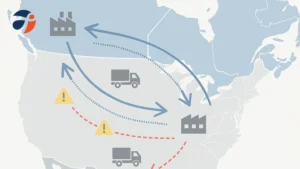Quick Summary:
As we approach 2025, the ocean freight industry faces significant bottlenecks, including port congestion, overcapacity, and evolving regulations. Navigating these challenges requires a proactive approach to ensure supply chain resilience. MacMillan Supply Chain Group offers expert insights and tailored solutions to help businesses overcome these obstacles and maintain efficient operations.
Introduction:
The ocean freight landscape in 2025 presents a complex web of challenges that can disrupt even the most well-oiled supply chains. Factors such as port congestion, vessel overcapacity, and shifting regulatory frameworks are causing delays, escalating costs, and creating uncertainty for shippers worldwide. At MacMillan Supply Chain Group, we understand the critical importance of addressing these bottlenecks head-on. Our team of seasoned logistics experts provides actionable insights and customized solutions designed to help businesses navigate these turbulent waters and maintain resilient supply chains.

The Persistent Challenge of Port Congestion
One of the most pressing issues facing the ocean freight sector in 2025 is the persistent challenge of port congestion. Major ports across Asia, Latin America, and North America are experiencing severe delays, with some bottlenecks lasting up to three weeks in critical hubs like Busan and Singapore. These delays are often exacerbated by labor shortages, adverse weather conditions, and inefficient cargo handling processes. Navigating these congested waters requires proactive planning and a willingness to explore alternative routing strategies. At MacMillan Supply Chain Group, we leverage our deep industry expertise to identify and implement the most efficient routes, minimizing delays and avoiding bottlenecks that can cripple supply chain operations.
The Double-Edged Sword of Overcapacity
The surge in container vessel orders has led to a concerning issue of overcapacity within the ocean freight sector. While this might initially suggest lower freight rates, the reality is far more complex. Overcapacity can strain carrier profitability, leading to cuts in service quality, reliability, and potentially higher costs for shippers in the long run. At MacMillan Supply Chain Group, we understand that navigating these turbulent waters requires strategic planning and a deep understanding of market dynamics. By optimizing shipping schedules, negotiating favorable rates, and leveraging our extensive industry network, we help our clients capitalize on market conditions without sacrificing operational efficiency.
Navigating the Evolving Regulatory Landscape
As we approach 2025, the ocean freight industry is grappling with the impacts of potential policy shifts and evolving global regulatory requirements. New tariffs, compliance standards, and environmental regulations are increasing the cost and complexity of ocean freight logistics. Failure to adapt to these changes can result in costly penalties, delays, and reputational damage. At MacMillan Supply Chain Group, we prioritize staying ahead of these regulatory shifts, offering comprehensive compliance strategies and adapting swiftly to new mandates. Our focus is on reducing the operational costs associated with compliance, ensuring that our clients remain competitive despite the ever-changing regulatory landscape.
The Imperative of Supply Chain Resilience
In the face of these multifaceted challenges, building supply chain resilience has become an imperative for businesses seeking to maintain a competitive edge. Resilience encompasses the ability to anticipate disruptions, mitigate their impact, and rapidly adapt to changing circumstances. At MacMillan Supply Chain Group, we partner with our clients to develop robust contingency plans, diversify supply bases, and implement advanced technologies that enhance visibility and agility across the entire supply chain network.

Common Problems and Our Solutions:
Port Congestion: MacMillan Supply Chain Group addresses port congestion by leveraging our extensive network and deep industry knowledge to identify alternative routing options, optimizing cargo flow, and collaborating with port authorities to streamline operations.
Overcapacity: We help clients navigate overcapacity challenges by optimizing shipping schedules, negotiating favorable rates, and providing strategic guidance on market trends and carrier dynamics.
Regulatory Compliance: Our dedicated compliance team stays ahead of regulatory changes, offering comprehensive strategies to ensure seamless adherence to evolving mandates, minimizing disruptions and penalties.
Supply Chain Disruptions: Through proactive risk management, diversification strategies, and the implementation of cutting-edge technologies, we enhance supply chain visibility, enabling rapid response and adaptation to unforeseen disruptions.
How Readers Can Avoid Problems and Implement Solutions:
To conquer the ocean freight bottlenecks of 2025 and build resilient supply chains, businesses must take a proactive approach. Partner with MacMillan Supply Chain Group to access our extensive industry expertise, leverage our strategic solutions, and stay ahead of the curve. Our tailored approach ensures that your supply chain operations remain efficient, cost-effective, and agile in the face of evolving challenges.
Contact MacMillan Supply Chain Group today to schedule a consultation and learn how our customized solutions can help your business navigate the ocean freight bottlenecks of 2025 and achieve long-term supply chain resilience.
FAQS
Port congestion in 2025 is primarily driven by a combination of factors, including labor shortages, inefficient cargo handling processes, and adverse weather conditions exacerbated by climate change. Additionally, an imbalance in container supply and demand, as well as infrastructure limitations at major ports, contribute to the bottlenecks.
To mitigate the impacts of overcapacity, businesses should focus on optimizing shipping schedules, negotiating favorable rates with carriers, and considering alternative modes of transportation when feasible. Additionally, diversifying supply chains and exploring near-shoring or reshoring strategies can help reduce reliance on ocean freight.
Non-compliance with evolving regulations in the ocean freight industry can result in costly penalties, shipment delays, and reputational damage. Businesses may face fines, cargo seizures, and even temporary bans from operating in certain regions if they fail to adhere to new tariffs, environmental regulations, or security protocols.
Advanced technologies such as real-time tracking, predictive analytics, and artificial intelligence can significantly enhance supply chain resilience. These technologies provide end-to-end visibility, enabling proactive risk management, optimized routing, and rapid adaptation to disruptions. Additionally, they facilitate data-driven decision-making and streamline operations, contributing to overall supply chain agility.
Partnering with a specialized logistics provider like MacMillan Supply Chain Group is crucial for businesses seeking to navigate the complex challenges of the ocean freight sector in 2025. Our deep industry expertise, extensive network, and tailored solutions ensure that our clients stay ahead of bottlenecks, regulatory changes, and market dynamics. We provide the strategic guidance and operational support necessary to maintain efficient, cost-effective, and resilient supply chains.




